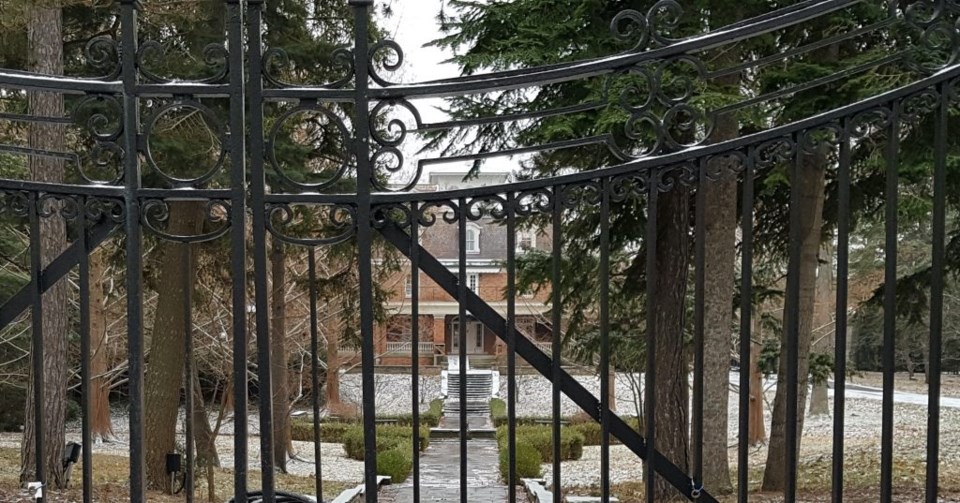
Benny Marotta has not won in court based on the merits of the case initiated by the town against the developer for clear-cutting trees on the Randwood Estate — he has had the charges stayed so they will not be heard in court.
The decision announced by a Justice of the Peace last Wednesday to stay the charges laid by the town is related to the Charter right to be tried within a reasonable time, said town CAO Marnie Cluckie.
“This decision means that the case will not be heard on its merits, and the trial will not proceed as initially scheduled.”
Cluckie said the town is appealing that decision — because of the timing coinciding with an election campaign, she has the delegated authority to make the call — and the new council will have the opportunity to decide whether they wish to continue or withdraw the appeal.
“There are time limits in place” to appeal, says Cluckie, “therefore, if we were to wait for the next council to decide, we would lose the opportunity to appeal.”
The Supreme Court of Canada set out a framework for establishing deadlines by which those accused need to be tried: 18 months for provincial court trials and 30 months for Superior Court trials.
In this circumstance, there were several factors contributing to the time delay, Cluckie said in an email to The Local. The COVID-19 pandemic was “an exceptional circumstance that significantly impacted the timing. The courts were effectively closed during this time.”
Court closures necessitated by COVID resulted in extensive trial delays, with implications for the Charter right to be tried within a reasonable time. “The JOP for this matter also cited delays related to the prosecution.”
There has been talk on social media of the town losing to Marotta on four counts. Cluckie explained the JOP ruled only on the charge of the delay in going to trial, but there were four properties involved, one charge for each, thus the four charges.
The second argument advanced by Two Sisters and Solmar, said Cluckie, was an attempt “to exclude certain evidence from the trial. However, the court did not make a decision on that argument, because the charges were stayed.”
The town had filed charges regarding the removal of trees on the Rand Estate in November 2018, just after the last municipal election, but before the new council was sworn in.
The JOP gave an oral decision in provincial court — the written decision will be obtained as part of the appeal, Cluckie said.
SORE, a community group with a mission to support reasonable development on the Randwood Estate property, was not a party to these proceedings, although it has been for several other legal cases over Randwood between the town and Solmar/Two Sisters, including an appeal by the Marotta group on its proposed Rand Estate subdivision, which is not expected to be heard until 2024.
Lyle Hall, spokesperson for SORE, says the decision to stay the charges on the tree-cutting comes just before the trial on the merits of the charges was set to begin — there were four days set aside for the hearing, beginning Oct. 17.
But on Sept. 12 the Marotta group’s challenge, based on the delay of the hearing, was heard, and the decision to stay the charges was released last week.
“Naturally, we are disappointed that the Marotta group continues to take evasive legal action by bringing a stay application based on delay, rather than having the charges dealt with on their merits. The decision is from a Justice of the Peace and can be appealed to a judge. Justice of the Peace decisions are not infrequently reversed by judges,” Hall says. “The Marotta group should not be allowed to dodge their day of reckoning in the courts.”
If an appeal of the stay is unsuccessful then “this case is not based on whether he (Marotta) did or didn’t do the right thing, and nobody wins,” says Hall, calling it an “unacceptable outcome for anyone who cares about the Rand Estate.”
Giuseppe Paolicelli, general manager of Solmar Development Corp., said in a press release issued Tuesday that Solmar and Two Sisters “are very happy with the court’s decision to no longer continue the case of the charges brought by the town under the Ontario Heritage Act on the basis that the delay in bringing the matter to trial is a breach of Solmar’s and Two Sister’s constitutional rights to be tried within a reasonable time.”
Solmar and Two Sisters “have consistently maintained that we did not breach the Ontario Heritage Act through the tree removal project in 2018,” says the press release.
“On any objective review of the facts of this case it is clear that there was no breach of the act, and the tree felling had no effect on any of the property’s heritage attributes.”
Solmar has maintained throughout the process that the town “had no reasonable or probable ground to institute the prosecution and that the prosecution was politically motivated and undertaken without merit,” says Paolicelli,
“The court’s decision to end the prosecution has avoided an unnecessary and costly trial and has saved us and the town and its taxpayers hundreds of thousands of dollars in unnecessary expenses.
“We look forward to working cooperatively with the town in moving the Rand subdivision application at 200 John Street east and 588 Charlotte Street forward. “